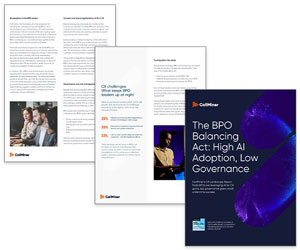Shauna Geraghty at Talkdesk provides information about the recommended soft skill set and the top call centre agent skills for successful hiring.
Hiring excellent customer support agents involves selecting candidates who can effectively address a customer’s needs, work well with a team, and enhance your team’s culture. The right agents will increase customer satisfaction, enhance customer loyalty, and add value to your company.
Call centre agents who are unhappy, ineffective, or unmotivated will monopolize managers’ time and energy, decrease team morale, and ultimately tarnish the image of your company. Building a customer support team that will excel should therefore be a priority.
Soft skills and personality traits can have a major impact on agents’ and team performance. Continue reading and get an insight on the soft skills to look for when hiring for the call centre job.
The Soft Skills to Look for When Hiring a Call Centre Agent
For every onboarding employee, there’s some training and development needed. From internal procedures to specific industry-related learning, technical knowledge is important—but not exclusive.
More than technical skills, you should consider the candidate’s soft skills. Soft skills combine social, communication, and personality traits that enable employees to perform well when complementing hard skills.
Regardless of the industry or if your agent is going to handle inbound or outbound calls, there are some basic soft skills that every agent should have:
- Knowledge retention. To provide the highest quality support to customers, agents need to learn and memorize a good amount of information about your company.
- Attention to detail. Paying attention to small details can help to solve issues better and reinforce relationships with customers.
- Organization. Agents should be capable of juggling multiple tasks at once while attending to the customer’s needs. However, you should provide them with the tools and environment they need to stay organized.
- Flexibility. Agents should be flexible enough to meet the customer base’s needs, i.e., handle a chatty customer one moment and an angry customer the next.
- Empathy. This goes without saying. Understanding and empathizing with customer issues is one of the most important, if not the most, skills of a call centre representative.
- Calm under pressure. Good agents don’t get angry customers personally and can keep their cool even in the most stressful calls.
- Effective communication skills. A good vocabulary and synthesis are fundamental to keep conversations with customers productive for both sides.
- Active listening. An agent who can practice active listening can fully understand what the caller is saying and listen to what is said behind the words.
- Quick thinking. The ability to quickly and effectively respond to a customer increases the first call resolution rates.
5 Things to Consider When Hiring a Call Centre Agent
Besides hard and soft skills, personality traits can significantly impact agents’ and team performance. Below are five things you should know when hiring an excellent customer support agent:
1. Personality Affects Job Performance
Organizational psychologists have found that personality accounts for unique variance in job performance after removing the effect of cognitive abilities. Therefore, you should choose candidates with the cognitive capacity to perform their job well, but keep in mind that knowledge about the product can be taught.
What cannot be manipulated are the personality characteristics one individual possesses that may or may not make them an ideal candidate. Personality therefore should be considered when screening potential applicants as an important factor in determining their ability to succeed in their desired position.
2. Personality Assessments are Useful
Recent research suggests that personality assessments are extremely useful and valid measures for predicting attitudes, job performance, job satisfaction, and outcomes in the workplace. Properly applied, personality assessments can be a helpful tool in the hiring process and reduce discrimination based on gender, ethnicity, and other factors.
Thus, personality testing is increasing in frequency as an important component of the personnel selection process for many major companies and should be considered essential for any company looking to make strategic hiring decisions.
3. The Big Five Matter
The Big Five Personality Factors are five major personality characteristics that exist on a continuum and strongly correlate with long-term job success. Meta-analysis shows an existing relationship between the Big Five and job performance in individuals employed in the customer service sector.
Below is an ordered list of personality characteristics that are correlated with customer service job performance.
- Conscientiousness. People who demonstrate a high score on this trait tend to be oriented for achievements, responsible, self-disciplined, organized, persistent, competent, methodical, deliberate, and dependable.
- Agreeableness. People who score high on this are usually good-natured, compassionate, cooperative, compliant, modest, sympathetic, and trusting.
- Openness. This is a trait often high scored by employees who are receptive to new experiences and thoughts, imaginative, artistically sensitive, intellectually curious, and creative.
- Emotional stability. Emotionally stable people are calm, secure, non-anxious, have good impulse control, and easily manage aversive events.
- Extraversion. These are usually gregarious, assertive, energetic, social, talkative, and ambitious employees.
Equip your hiring team with this information and train them to recognize these five personality traits in each candidate.
4. Team-Related Behavior and Performance Should Always be Assessed
When hiring, you should always consider how well a potential employee will work within a team setting. Finding the right candidates will facilitate collaboration, boost team morale, and enhance team culture.
Extraversion, conscientiousness, and emotional stability are the personality constructs significantly correlated with team-related behavior and performance. Thus, assessing these three dimensions can be an effective tool when considering a potential candidate’s goodness of fit within a team.
5. Hire a Professional or Choose an Alternative
A professional with proper training should conduct the selection, administration, and interpretation of personality measures in hiring practices. There are both legal and ethical factors to consider; asking a manager to make these important decisions without proper training can result in legal issues.
When hiring a consultant isn’t within your budget, below are more cost-effective solutions:
- Internet-based assessments of personality. These tests offer the convenience of flexible administration, instant results, and are cost-effective. Recent research has found that certain internet-based tests and their costly competitor, the paper and pencil test, have comparable results.
- Observer rating of personality. Using both self-report measures and observer ratings of personality produces the most valid selection measures. Train your hiring staff to look for specific qualities and pair these observations with results from an internet-based assessment for optimal results.
- Self-report questionnaire. A less valid but often informative method is to ask your potential employee to assess their personality using a self-report measure. You can hire a consultant to compile a list of questions that assess each construct, use one available online, or develop your own (not advised).
Hiring the best talent starts with equipping your team with the most effective tools and guidelines that will help them make informed decisions. A combination of hard and soft skills and personality traits is essential.
It will provide a good return on investment—carefully chosen team members will increase retention rates and reduce employee turnover (and the costs). It will also increase customer satisfaction, boost team morale, and positively influence your team’s culture.
This blog post was originally published by Talkdesk in January 2013, and updated in October 2021.
Author: Guest Author
Published On: 15th Oct 2021
Read more about - Guest Blogs, Talkdesk







































